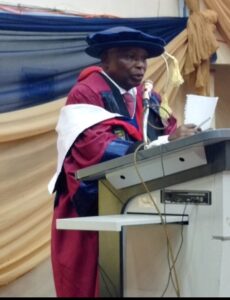

By correspondent in Ilorin.

The Attorney General of the Federation and Minister of Justice, Prince Lateef Fagbemi (SAN), has called for an overhaul of Nigeria’s educational system to foster democratic values and secure the future of the nation.
Speaking at the 39th convocation ceremony of the University of Ilorin on Friday, Fagbemi delivered a lecture titled “Nurturing Democratic Values and Education for the Future of Nigeria”, where he stressed the critical need for integrating democracy into the education curriculum.
He argued that the system must promote the principles of tolerance, respect for others, and adherence to the rule of law.
“Our educational system must be reformed to instill democratic values such as engagement, transparency, and collaboration,” Fagbemi stated.
The Attorney General emphasized that democracy should be viewed not just as a theoretical concept, but as an active system that drives participation and inclusivity.
Fagbemi underscored that the transformation of Nigeria’s education sector should prioritize changing citizens’ mindsets, fostering openness to societal and historical truths, and cultivating respect for diversity.
He questioned whether the current system is equipped to fulfill these tasks.
“Success in education should be measured by how well it prepares citizens to contribute meaningfully to democracy,” he said, warning that the existing curriculum, rooted in colonial times, is inadequate for the nation’s evolving needs.
The Attorney General called for a rejection of violence and urged Nigerians to embrace democratic principles in order to build a just and equitable society.
He also encouraged the graduates to use their education for societal good, urging them to think creatively, advocate for democracy, and work towards a peaceful and united Nigeria.
In his closing remarks, University of Ilorin Vice Chancellor, Professor Wahab Egbewole (SAN), echoed Fagbemi’s sentiments, stressing the vital role of education in democracy.
“No education, no nation,” he remarked, reminding graduates of their responsibility to hold leaders accountable and contribute to national progress.
Edited by Dada Ahmed.


